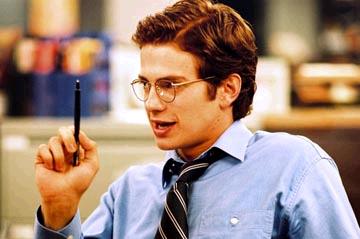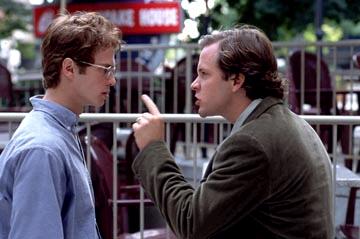

In journalism, integrity is everything. How can people trust what a paper or magazine prints if said publication has a history of printing half-truths, or even lies? The issue of integrity is so important that when a publication's integrity is called into question, other publications take notice, but the general public doesn't seem to care that much. A few years ago, newspapers jumped all over the Los Angeles Times for the breakdown of the traditional wall between editorial and marketing in its coverage of the opening of "the" Staples Center. Earlier this year, the venerable New York Times came under fire (and later had a mini editorial housecleaning) after it was discovered that reporter Jayson Blair had fabricated many of the facts in his stories. This is eerily similar to Stephen Glass, the subject of Shattered Glass. Glass wrote for The New Republic, an influential political magazine. Glass fabricated a number of facts and stories and brought about his own downfall.
Aside from all the ethical ramifications, Shattered Glass is fascinating to watch because while there is little action, the Glass character (portrayed by Hayden Christensen, Attack of the Clones, Life as a House) is a train wreck waiting to happen. Especially since writer/director Billy Ray (Hart's War, Volcano) lets everybody know that Glass is faking. So the audience knows, Glass knows, and it's just a matter of seeing how all his co-workers discover his secret. Shattered Glass, based on a magazine article by Buzz Bissinger, never delves into why Glass did what he did. Instead, it lets events play out by themselves, forming a character study of a sort for a "very troubled young man," as many of his coworkers point out. Some of Glass' motivations surely came from a desire for attention. He adored the reactions he would get out of the New Republic staff at editorial meetings where he described his fake stories. And he was able to get away with it by ingratiating himself to everybody he worked with and profusely apologizing for every miniscule mistake, even offering to resign over trivial matters.
Glass' problems came to a head over a piece entitled "Hack Heaven." In it, he described how a young hacker broke into the website for Jukt Micronics and posted naked pictures of women and the salaries of Jukt executives, only to have Jukt hire him as a security consultant. Adam Penenberg (Steve Zahn, Daddy Day Care, National Security), a writer for Forbes Digital, was asked to look into the piece, since he should have scooped it. The more he looks into it, the more he discovers that he cannot verify anything. The matter falls into the hands of Glass' new editor Chuck Lane (Peter Sarsgaard, K-19: The Widowmaker, The Salton Sea) is trying to do the correct thing. He doesn't have the loyalty of the staff, and any attack on Glass looks like a preemptive move to oust supporters of the last editor, Michael Kelly (Hank Azaria, Bark, America's Sweethearts). Lane must balance this with Glass' actions with the journalistic reputation of The New Republic.
As Lane's investigation reveals further inconsistencies, Glass becomes increasingly desperate. He cannot seem to admit he lied, and just keeps inventing lies, each one lamer and more audacious than the last. Caitlin Avery (Chloe Sevigny, Party Monster, Demonlover) is one of Glass' believers, who is ready to quit if Lane fires Glass. Ray keeps the events taut, coupled with some tough acting by his principles. Zahn stands out the most. He usually keeps to dorky supporting roles, but every time he strays into drama (like Riding in Cars With Boys) the results are always spectacular. He brings a quiet sense of seriousness to his roles. The same goes for Sarsgaard, who successfully channels rage, frustration, and helplessness all at the same time. Christensen acquits his horrid performance in Attack of the Clones, but still has a strange, stilted delivery here. It actually helps this time, but making Glass seem a tad off-kilter. Now it's just a matter of time before he sucks again in the last Star Wars film.